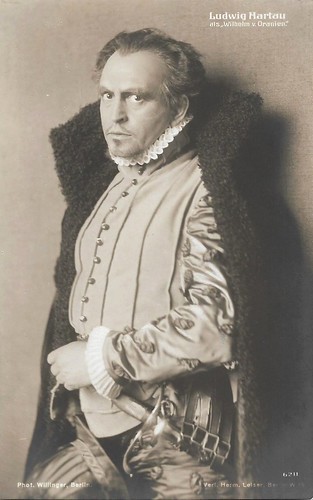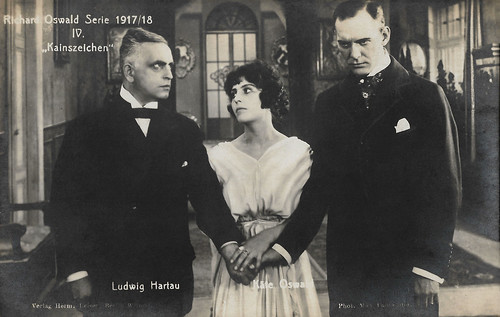Ludwig Hartau (1877-1922) was a German stage and screen actor. From 1897 he acted on stage, and in 1904 he joined Max Reinhardt's Deutsches Theater. He became famous for his performances in plays by Ibsen and Strindberg. While already a reputed actor and stage teacher, Hartau dared at the age of 35 years to debut on the silent screen as well. Before his sudden death in 1922, he worked with such directors as Fritz Lang and Ernst Lubitsch.

German postcard by Photochemie, no K. 1800. Photo: Wilhelm Willinger, Berlin.

German postcard by Verlag Hermann Leiser, no. 6211. Photo: Wilhelm Willinger, Berlin. Ludwig Hartau as Wilhelm von Oranien (William of Orange) in Goethe's 'Egmont' (Egmond), by the Deutsches Schauspielhaus.

German postcard by Ross Verlag, no. 645/6. Photo: Union Film. Henny Porten (Anna Boleyn) and Ludwig Hartau (Duke of Norfolk, Anna's uncle) in Anna Boleyn (1920) by Ernst Lubitsch.
Ludwig Hartau was born in Trachenberg, Silesia, Germany (now Żmigród, Polen) in 1877.
From 1897 he acted on stage, and in 1904 he joined Max Reinhardt's Deutsches Theater. Hartau was famous for his performances in plays by Henrik Ibsen and August Strindberg such as 'Die Wildente' (The Wild Duck), 'Hedda Gabler', 'Traumspiel' (A Dream Play), and 'Der Totentanz' (The Dance of Death), but also for his performance as Dr. Schön in Frank Wedekind's 'Erdgeist' (Earth Spirit).
He was also a noted stage teacher, who e.g. taught Ursula Krieg and Ernst Josef Aufricht.
At the age of 35, Hartau dared to debut on the screen as well. Though he already acted in film from 1912, first in Europäisches Sklavenleben/European slave life (Emil Justitz, 1912) with Friedrich Zelnik, his real breakthrough came around 1916.
In the later 1910s and early 1920s, Hartau had a very prolific film career, acting opposite actresses such as Maria Orska, Eva Speyer, and Hella Moja, and actors such as Carl Auen, Albert Bassermann, Ernst Hoffmann, Max Landa, and Paul Wegener.

German postcard by Verlag Hermann Leiser, Berlin. Photo: Max Fassbender / Richard Oswald-Film. Käthe Oswald and Ludwig Hartau in Kainszeichen/The Mark of Cain (Richard Oswald, 1917). Caption: Richard Oswald series 1917-18, IV. The man on the right could be Alexander von Antalffy.

German postcard by Verlag Hermann Leiser, Berlin, no. 5405. Photo: Max Fassbender / Richard Oswald-Film. Käthe Oswald and Ludwig Hartau in Kainszeichen/The Mark of Cain (Richard Oswald, 1917). Caption: Richard Oswald series 1917-18, IV. Ludwig Hartau played the lead in this film as the virtuous Herbert Jensen, who is accused of having murdered his immoral brother Jacob (Ernst Pittschau) but is acquitted. Still, the mark of Cain sticks to him - the suspicion of having killed his own brother, just like Cain had slain Abel.

German postcard by Verlag Hermann Leiser, no. 561. Photo: Zander & Labisch, Berlin. Ludwig Hartau in the play 'Der Hauch im All' (1918), a tragedy by Walter von Molo.
Ludwig Hartau collaborated on two major German silent films, under the direction of Ernst Lubitsch and Fritz Lang.
The first was Kämpfende Herzen/Vier um die Frau/Four Around a Woman (Fritz Lang, 1920-21). Hartau played a man who unjustly suspects his wife (Carola Toelle) of adultery and turns his house into the site of criminal acts.
In Anna Boleyn (Ernst Lubitsch, 1920), he was the Duke of Norfolk, who matched his niece Anna Boleyn (Henny Porten) with Henry VIII (Emil Jannings).
Hartau also played famous political characters such as Louis XV in Marie Antoinette - Das Leben einer Königin/Marie Antoinette (Rudolf Meinert, 1922), opposite Diana Karenne, and Napoleon in Die Tochter Napoleons/Napoleon's Daughter (Friedrich Zelnik, 1922), opposite Lya Mara.
He even acted in a German-Italian Maciste film: Maciste und die Tochter des Silberkönigs/Maciste e la figlia del re dell'argento/Maciste and the daughter of the Silver King (Luigi Romano Borgnetto, 1922), starring Bartolomeo Pagano and Helena Makowska.
At the peak of his career, in 1922, Ludwig Hartau suddenly died. He was only 45. Alfred Abel overtook his lead as Ivan the Terrible in Der falsche Dimitry/The False Dimitri (Hans Steinhoff, 1923), while Das schöne Mädel/The beautiful girl (Max Mack, 1923), starring Hella Moja and with Hartau as a department store owner, would be released after his death.

German postcard by Ross Verlag, Berlin, no. 645/5, 1919-1924. Photo: Union. Henny Porten, Emil Jannings, and Ludwig Hartau in Anna Boleyn (Ernst Lubitsch, 1920).

German postcard by Kunstverlag Juno, Charlottenburg, no. 126. Photo: Alice Mitzdorf. Ludwig Hartau and Ms. Frank-With.

German postcard by Verlag Hermann Leiser, Berlin, no. 2215. Photo: B.J.G. Ludwig Hartau as Hjalmar Ekdal in the play 'Die Wildente' (The Wild Duck) (1884) by Henrik Ibsen. The German premiere of the version of 'Die Wildente' to which this card refers (the earliest German version already took place in 1887), took place at the Theater in der Königgrätzer Straße, on 7 November 1917. In addition to Hartau other actors were a.o. Rudolf Lettinger, Friedrich Kayßler, Reinhold Schünzel, Helene Fehdmer, Maria Orska, Olga Engl, and Richard Leopold. The director was Karl Meinhard.

German postcard by Verlag Hermann Leiser, no. 9275. Photo: Zander & Labisch, Berlin. Ludwig Hartau as Dr. Schön in the play 'Erdgeist' by Frank Wedekind, performed in Berlin in 1917, and with Maria Orska as Lulu. 'Erdgeist' would be adapted for film various times, e.g. with Dr. Schön played by Albert Bassermann (Erdgeist, Leopold Jessner, 1923) and Fritz Kortner (Die Buchse der Pandora/Pandora's Box, G.W. Pabst 1929).
Sources: Stephanie D'Heil (Steffi-Line - German), Filmportal.de, Wikipedia (German), and IMDb.
This post was last updated on 18 August 2024.

German postcard by Photochemie, no K. 1800. Photo: Wilhelm Willinger, Berlin.

German postcard by Verlag Hermann Leiser, no. 6211. Photo: Wilhelm Willinger, Berlin. Ludwig Hartau as Wilhelm von Oranien (William of Orange) in Goethe's 'Egmont' (Egmond), by the Deutsches Schauspielhaus.

German postcard by Ross Verlag, no. 645/6. Photo: Union Film. Henny Porten (Anna Boleyn) and Ludwig Hartau (Duke of Norfolk, Anna's uncle) in Anna Boleyn (1920) by Ernst Lubitsch.
Max Reinhardt
Ludwig Hartau was born in Trachenberg, Silesia, Germany (now Żmigród, Polen) in 1877.
From 1897 he acted on stage, and in 1904 he joined Max Reinhardt's Deutsches Theater. Hartau was famous for his performances in plays by Henrik Ibsen and August Strindberg such as 'Die Wildente' (The Wild Duck), 'Hedda Gabler', 'Traumspiel' (A Dream Play), and 'Der Totentanz' (The Dance of Death), but also for his performance as Dr. Schön in Frank Wedekind's 'Erdgeist' (Earth Spirit).
He was also a noted stage teacher, who e.g. taught Ursula Krieg and Ernst Josef Aufricht.
At the age of 35, Hartau dared to debut on the screen as well. Though he already acted in film from 1912, first in Europäisches Sklavenleben/European slave life (Emil Justitz, 1912) with Friedrich Zelnik, his real breakthrough came around 1916.
In the later 1910s and early 1920s, Hartau had a very prolific film career, acting opposite actresses such as Maria Orska, Eva Speyer, and Hella Moja, and actors such as Carl Auen, Albert Bassermann, Ernst Hoffmann, Max Landa, and Paul Wegener.

German postcard by Verlag Hermann Leiser, Berlin. Photo: Max Fassbender / Richard Oswald-Film. Käthe Oswald and Ludwig Hartau in Kainszeichen/The Mark of Cain (Richard Oswald, 1917). Caption: Richard Oswald series 1917-18, IV. The man on the right could be Alexander von Antalffy.

German postcard by Verlag Hermann Leiser, Berlin, no. 5405. Photo: Max Fassbender / Richard Oswald-Film. Käthe Oswald and Ludwig Hartau in Kainszeichen/The Mark of Cain (Richard Oswald, 1917). Caption: Richard Oswald series 1917-18, IV. Ludwig Hartau played the lead in this film as the virtuous Herbert Jensen, who is accused of having murdered his immoral brother Jacob (Ernst Pittschau) but is acquitted. Still, the mark of Cain sticks to him - the suspicion of having killed his own brother, just like Cain had slain Abel.

German postcard by Verlag Hermann Leiser, no. 561. Photo: Zander & Labisch, Berlin. Ludwig Hartau in the play 'Der Hauch im All' (1918), a tragedy by Walter von Molo.
Fritz Lang and Ernst Lubitsch
Ludwig Hartau collaborated on two major German silent films, under the direction of Ernst Lubitsch and Fritz Lang.
The first was Kämpfende Herzen/Vier um die Frau/Four Around a Woman (Fritz Lang, 1920-21). Hartau played a man who unjustly suspects his wife (Carola Toelle) of adultery and turns his house into the site of criminal acts.
In Anna Boleyn (Ernst Lubitsch, 1920), he was the Duke of Norfolk, who matched his niece Anna Boleyn (Henny Porten) with Henry VIII (Emil Jannings).
Hartau also played famous political characters such as Louis XV in Marie Antoinette - Das Leben einer Königin/Marie Antoinette (Rudolf Meinert, 1922), opposite Diana Karenne, and Napoleon in Die Tochter Napoleons/Napoleon's Daughter (Friedrich Zelnik, 1922), opposite Lya Mara.
He even acted in a German-Italian Maciste film: Maciste und die Tochter des Silberkönigs/Maciste e la figlia del re dell'argento/Maciste and the daughter of the Silver King (Luigi Romano Borgnetto, 1922), starring Bartolomeo Pagano and Helena Makowska.
At the peak of his career, in 1922, Ludwig Hartau suddenly died. He was only 45. Alfred Abel overtook his lead as Ivan the Terrible in Der falsche Dimitry/The False Dimitri (Hans Steinhoff, 1923), while Das schöne Mädel/The beautiful girl (Max Mack, 1923), starring Hella Moja and with Hartau as a department store owner, would be released after his death.

German postcard by Ross Verlag, Berlin, no. 645/5, 1919-1924. Photo: Union. Henny Porten, Emil Jannings, and Ludwig Hartau in Anna Boleyn (Ernst Lubitsch, 1920).

German postcard by Kunstverlag Juno, Charlottenburg, no. 126. Photo: Alice Mitzdorf. Ludwig Hartau and Ms. Frank-With.

German postcard by Verlag Hermann Leiser, Berlin, no. 2215. Photo: B.J.G. Ludwig Hartau as Hjalmar Ekdal in the play 'Die Wildente' (The Wild Duck) (1884) by Henrik Ibsen. The German premiere of the version of 'Die Wildente' to which this card refers (the earliest German version already took place in 1887), took place at the Theater in der Königgrätzer Straße, on 7 November 1917. In addition to Hartau other actors were a.o. Rudolf Lettinger, Friedrich Kayßler, Reinhold Schünzel, Helene Fehdmer, Maria Orska, Olga Engl, and Richard Leopold. The director was Karl Meinhard.

German postcard by Verlag Hermann Leiser, no. 9275. Photo: Zander & Labisch, Berlin. Ludwig Hartau as Dr. Schön in the play 'Erdgeist' by Frank Wedekind, performed in Berlin in 1917, and with Maria Orska as Lulu. 'Erdgeist' would be adapted for film various times, e.g. with Dr. Schön played by Albert Bassermann (Erdgeist, Leopold Jessner, 1923) and Fritz Kortner (Die Buchse der Pandora/Pandora's Box, G.W. Pabst 1929).
Sources: Stephanie D'Heil (Steffi-Line - German), Filmportal.de, Wikipedia (German), and IMDb.
This post was last updated on 18 August 2024.
No comments:
Post a Comment